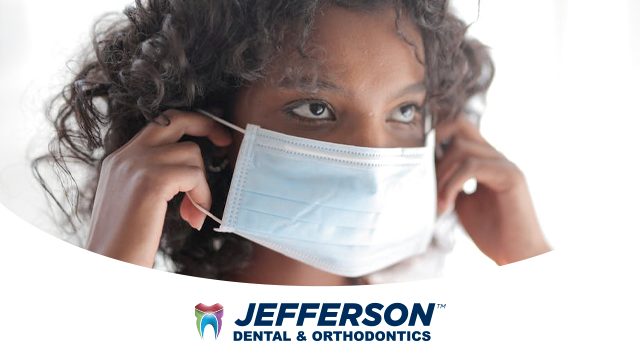
We’ve spent a lot of time wearing masks lately, and not as fashion statements. Wearing a mask remains an excellent way to prevent the spread of viruses, like COVID-19. You can protect yourself and those around you from contracting COVID-19.
However, wearing masks for prolonged periods can have some undesirable side effects, like mask mouth. Getting rid of masks isn’t the best answer for your health – or anybody else’s – instead there are ways to alleviate the symptoms.
Symptoms of Mask Mouth
What is mask mouth? In short, it’s a collection of oral issues related to wearing masks for long periods of time. Mask mouth symptoms include:
- Dry mouth, known as xerostomia, happens when you don’t produce enough saliva.
- Bad breath can be more intense because your mask traps the smell.
- Bleeding or inflamed gums could indicate gingivitis due to bad bacteria and plaque buildup around your gums.
Causes of Mask Mouth
Mask mouth is likely caused by a combination of factors related to prolonged mask wearing. Professionals speculate that wearing a mask and other COVID precautions may discourage people from drinking as much water as they did before the pandemic. Additionally, there’s less saliva production than usual.
Plus, people have been consuming more alcohol and coffee during the pandemic, meaning more sugars and acids. Factor in the decreased water intake and reduced saliva production, and you have a trifecta of problems – increased buildup of bad bacteria, your teeth don’t get as clean, and acids don’t get neutralized.
To complicate matters further, two other issues arise with prolonged mask wearing.
- Mask wearing can disrupt your breathing patterns, leading to fast, shallow breaths instead of slow deep breaths, usually out of your mouth. Instead of breathing through your nose, the increase in mouth breathing further reduces your saliva output.
- Recycling air will not kill you as some people claim, but the recycled air could increase the acidity in your mouth.
Impact of Face Masks on Oral Health
Unfortunately, mask mouth syndrome appears to affect oral health in unexpected ways. Dentists note a rise in inflammation of the gums and tooth decay in patients who previously had no issues.
Changes in eating and drinking behavior due to the pandemic and regular mask wearing has also been a cause for concern. Aside from increased coffee and alcohol intake, the way we eat and how often we can manage oral hygiene has changed. It’s not as easy to drink water after a meal to help wash away the debris and bad bacteria.
How to Prevent Mask Mouth
Thankfully, wearing a mask goes a long way in keeping everyone safer during the pandemic.
Wearing a mask is important for everyone’s health, so knowing how to prevent mask mouth is your best bet.
- Stay on top of your oral care routine by brushing and flossing daily. Make sure you brush for two minutes each time and catch all surfaces to remove as much debris and bacteria as possible.
- Mouthwash is helpful, so keep a travel-sized bottle handy.
- Carry sugar-free gum to help in a pinch.
- Monitor your teeth and gums for signs of discoloration, bleeding, inflammation, or tenderness.
- Hydrate whenever possible and limit how much coffee and alcohol you drink.
- One of the best mask mouth treatments is using a clean mask every time you put one on.
- Keep your regular preventative care checks. Your dentist can identify potential issues early when you go every six months.
If you have concerns about the effects of mask mouth on your oral health or need a check-up and professional teeth cleaning, Jefferson Dental & Orthodontics can help. Book an appointment at the office nearest you!




